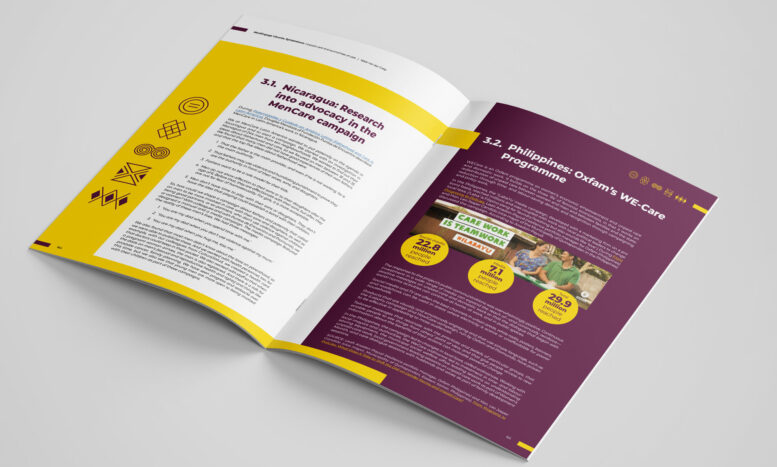‘Care is at the heart of so much of the work and thinking on men and boys and gender equality’
The 3rd MenEngage Global Symposium spanned 7 months and hundreds of hours of discussion. More than 600 speakers and panelists took part in the event, addressing a broad range of topics relating to transforming masculinities and engaging men and boys for gender, social, and climate justice. Nikki van der Gaag was one of the lead authors tasked with digesting this rich and diverse discussion and compiling key insights and recommendations into a discussion paper. Focussing on Unpaid Care and Economies of Care, Nikki reviewed many hours of recordings from the symposium (in addition to taking part as a speaker in some symposium sessions). In this blog post, Nikki shares personal reflections and insights based on the experience of creating this paper.
Click here to read the Ubuntu Symposium Discussion Paper: Unpaid Care and Economies of Care
In what ways do you feel the symposium discussions reflect the interrelated crises the world is facing today?
Like most of us, I have been holding my breath while Russia invades Ukraine. I have watched the families holed up underground, listening to their fear but also seeing their determination and resilience in the face of such terrible force. They so obviously care for each other, for their communities and neighbourhoods, towns and villages, for their country.
I also see the faces of the soldiers on both sides, who are all young – often very young – men. Many of whom are likely to lose their lives. They too must be afraid even if they cannot show their fear. Where is the care here?
Care became urgent and central to the world during the pandemic. Now it is showing its relevance in the lives of the people of Ukraine when faced with an army sent by an autocrat who embodies all the negative traits of hyper-masculinity and aggression.
We have seen this before, in other countries, in other contexts. We know this is what those of us working on gender equality are standing against. And why the vital importance of care, in all its forms, to all of us, is once again being thrown into sharp relief in the face of brutal violence.

In what ways do you feel the discussion has changed or evolved in the time you have been working on the topic of unpaid care?
Unpaid care and domestic work has long been a key topic for feminists and feminist economists, but it has not generally included men and boys. I think there is increasing interest in how men and boys, and other gender identities as well, can be included in debates that go beyond redistribution of care and domestic work in the home to looking at gender more structurally in the wider care economy. But there are also wider implications for care more broadly, in terms of countering backlash and promoting a more care-ful world.
What did you find inspiring when working on the paper?
It was wonderful to be part of such an insightful and knowledgeable team, and inspiring to join the many feminist-inspired sessions throughout the seven months of the Symposium. It was also heartening to be able to build on past and present work by feminist organisations on this topic, and to be able to see care through the lens of the COVID-19 pandemic.
In what ways was it challenging to write about this topic?
Care in its many wider manifestations could be said to lie at the heart of so much of what is included in work and thinking on men and boys and gender equality. The main challenge was that instead of revisiting more than 40 hours of webinars, I could have included the whole Symposium! Care is about so much more than individuals, important though this is. It is interwoven with all the topics of the Symposium, from power to backlash to feminism and intersectionality of all kinds. It is also structural, and as such requires structural change.
What is it about this topic that made you want to dive deeply into the symposium discussions to shape and inform the paper?
I have worked on unpaid care for a number of years with different organisations. I have seen how crucial it is to understanding how power in the household works and how gender inequalities remain entrenched.
As we see how the pandemic has increased inequalities of all kinds, it becomes ever more urgent to address the imbalance in unpaid care. This involves building a caring economy where all policy decisions are based on care not competition; where men and women share care equally, and where an ethic of care can counter the violence so evident in our world today.
Only then will we finally achieve gender equality and social justice for all.
About Nikki van der Gaag

Nikki van der Gaag is a former Director of Gender Justice and Women’s Rights at Oxfam GB (2016 – 2019). She is now an independent consultant and writer, and Senior Fellow at Promundo, who works primarily on gender, with a focus on girls and on masculinities. She is the lead author of the latest State of the World’s Fathers Report (Men Care, 2019), author of the ‘No-nonsense guide to Feminism’ (2017) and ‘Feminism and Men’ (Zed Press, 2014), and has been the principal author of six of the eight State of the World’s Girls reports published by Plan International.
